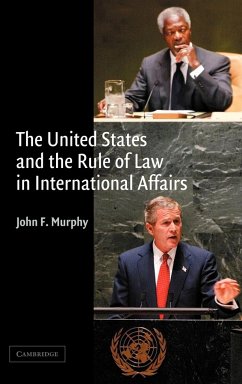Short description/annotation
John Murphy analyses why the US finds it increasingly difficult to adhere to the rule of law in international affairs.
Main description
John Murphy offers an insightful analysis of why the United States does not always accept the rule of law in international affairs, even though it has made immense contributions to its creation, adoption, and implementation. Examining the reasons for this failure, John Murphy analyses a number of cases, not to make a case that the United States has been an international outlaw, but to illustrate the wide-ranging difficulties standing in the way of US adherence to the rule of law. He explains how the nature of the US legal system and the idiosyncrasies of the international legal process combine to compound problems for the United States, and he explores several alternative scenarios for the position of the United States vis-à-vis international law. This timely book offers a much needed examination of US attitudes and practices and makes a major contribution to the contemporary literature in international law and international relations.
Table of contents:
1. Introduction; 2. The status of international law under US law; 3. UN dues; 4. Use of force; 5. Arms control, disarmament, non-proliferation and safeguards; 6. Law of the sea; 7. The international court of justice; 8. Prevention, prosecution, and punishment of international crimes; 9. Human rights and international environmental issues; 10. Summary and conclusions and some possible future scenarios.
Hinweis: Dieser Artikel kann nur an eine deutsche Lieferadresse ausgeliefert werden.
John Murphy analyses why the US finds it increasingly difficult to adhere to the rule of law in international affairs.
Main description
John Murphy offers an insightful analysis of why the United States does not always accept the rule of law in international affairs, even though it has made immense contributions to its creation, adoption, and implementation. Examining the reasons for this failure, John Murphy analyses a number of cases, not to make a case that the United States has been an international outlaw, but to illustrate the wide-ranging difficulties standing in the way of US adherence to the rule of law. He explains how the nature of the US legal system and the idiosyncrasies of the international legal process combine to compound problems for the United States, and he explores several alternative scenarios for the position of the United States vis-à-vis international law. This timely book offers a much needed examination of US attitudes and practices and makes a major contribution to the contemporary literature in international law and international relations.
Table of contents:
1. Introduction; 2. The status of international law under US law; 3. UN dues; 4. Use of force; 5. Arms control, disarmament, non-proliferation and safeguards; 6. Law of the sea; 7. The international court of justice; 8. Prevention, prosecution, and punishment of international crimes; 9. Human rights and international environmental issues; 10. Summary and conclusions and some possible future scenarios.
Hinweis: Dieser Artikel kann nur an eine deutsche Lieferadresse ausgeliefert werden.








